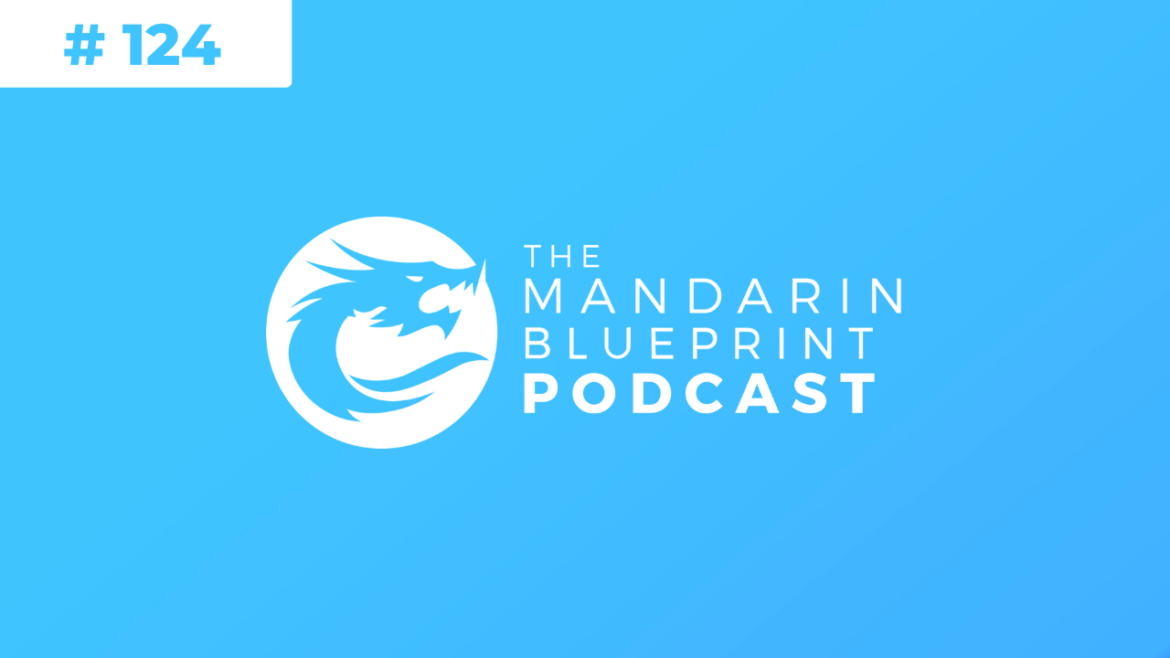
124. Analyzing Chinese vs. Acquiring Chinese
欢迎光临! Welcome!
You can now subscribe to the podcast by the links below, or you can subscribe by copying the following URL into your favorite podcast APP.
The Mandarin Blueprint Podcast focuses primarily on The Blueprint online curriculum. Creators Luke Neale & Phil Crimmins answer questions and comments, discuss topics related to China and Mandarin learning, and have special guests.
Want to learn how to speak fluent Chinese fast? Join our free Webinar right here.
欢迎光临! Welcome!
You can now subscribe to the podcast on iTunes, Stitcher, Spotify, or you can subscribe by copying the following URL into your favorite podcast APP:
https://www.mandarinblueprint.com/feed/podcast/
The Mandarin Blueprint Podcast focuses primarily on The Mandarin Blueprint Method online curriculum. Creators Luke Neale & Phil Crimmins answer questions and comments, discuss topics related to China and Mandarin learning, and have special guests.
0:00 Affiliate Link & Reviews
Become a Mandarin Blueprint Affiliate
Leave us a Google Business Review 🙂
8:17 Comments & Emails
Ceri Woods by Community
Hi!
I’m 33, from the UK and I’ve been here for around a month. I’ve been trying to learn Chinese for a while, but after getting diagnosed with adhd recently I’ve realised I can’t just try to squeeze into the regular learning style and have been trying to figure out what works for me. I would love to know if there are any other neurodivergent people out there who find this method as helpful as me?! It really plays amazingly into how I already make and retain memories, and I’ve found it so exciting and motivating!
Thanks so much for this course ?
11:22
Jessica m by Community
I was going to wait until I finished foundation to post this, but I’m jumping the gun by about two lessons and posting this feedback now: Mandarin Blueprint dramatically improved my chinese reading speed……. Just by itself — and I can’t explain how. I normally read in Traditional characters. I didn’t do most of the readings and skip through much of the materials in the foundation course because I was already above that level. Some I would read and/or listen to once and move on. Some I would skip entirely. The stories phase is more interesting and I give these a bit more attention.
I just re-read one of the Mandarin Breeze book and flew through it. I thought It was one of the level 3 books. but it was actually one of the Level 4 books! I could read it almost as fast as a normal adult could read english with the exception of unknown vocabulary (I read much faster so not my english reading speed yet, but that is coming eventually, I’m sure!). And I read it in traditional characters. (so the MB method didn’t even cleanly transfer to this material)
I suspect that as predicted by FMRI studies of reading (generally that have been done in english and other alphabetic languages) that the ability to write is strongly linked to the ability to read. And that the ability to write most chinese characters by frequency dramatically increases reading speed.
15:11
Bunny by Community
Wow. i have been listening to podcast and reading the ” Mastering Mandarin in the modern world” book and watched some course videos today. (Finishing the Rapid Acquisition Crash Course)
But now it is 22:42 and even though i am at page 72 of the book (Yes, i am not a fast reader, but then again, english is not my native language either, so i have to look up all the difficult words ) I seem to be daydreaming constantly of all my good times in Shenzhen. It seems that i seem to remember all kinds of different places, how the chinese people helped me etc etc.
If such thing happens, and i just wont go away…. Is that a sign that you have learned enough for today? Or should i just push on and try to focus more? Because no matter what i do, it seems that my daydreaming becomes more intense now. Heck, i was even dreaming that i was having a conversation with Luke in chinese while drinking an beer!
And i dont speak chinese and i dont even drink beer!
18:32
Soren Korsbaek by Community
Quick question for Phil & Luke followed by some general thoughts:
I know that the plan is to expand the course to include more than the 15xx characters currently in the intermediate course. I am curious when the course will be expanded beyond this?
Nearing the 1000 mark, If possible, I am keen to schedule the pace of my character-learning according to the release. The thought of having to pause and not learning new characters for a while strikes me as rather odd! 😀
That said, no doubt it would serve me well to pause and focus on listening and pronunciation/speaking . My experience at level 45 is still that listening comprehension remains extremely difficult. I know this is to be expected and has been addressed multiple times already but I am still hoping I’ll see a rapid improvement in how I experience listening.
I am currently watching “Take My Brother Away” on Netflix with the plug-in that allows for both Mandarin and English subtitles. It’s quite remarkable and extremely motivating just how much I can comprehend from reading but I must admit that, although the spoken Mandarin in the series is very clear, a lot of sentences that are easily comprehensible from reading goes completely above my head without the subtitles. Hopefully it gets better with practice… the gap between listening and reading comprehension in comparison to what I experienced with my Japanese studies has really taken me by surprise.
That said, I’d recommend the above series. A lot of everyday conversations and a very light watch.
32:45
Marta Melvin by Email
Hi Luke and Phil
30 years ago I was able to read a good amount of a Chinese ‘on the street’ whether in Simplified characters on the mainland or in Taiwan. I could follow traditional Chinese subtitling used on TV in Taiwan, read retail & civic signage and understand news stories in the papers. But I’ve lost a lot of that power of recognition over the intervening 29 years where I haven’t been in either China or Taiwan. And so starting the MTB from scratch is really interesting. Because most importantly it’s about training my brain in the method.It’s great to be moving forwards. I’m not tearing through it as I’ve got a lot on currently. But I AM doing Anki every day, and spending as much time as I can working through the videos.
For me it has become a bit like training for a half marathon. Not my first half marathon, so I kinda know where I’ve got to go. At this point I’m still working with characters I am familiar with and probably will be for a while, and that makes it great for me as it’s like running on a familiar training route. But however well you know the route, you still have run it and keep on running it in order to build up the muscle memory and strength. Gotta do the miles.And you’re right it’s a really fun method bringing into movies such an assortment of actors, sets and props and using components.
I wasn’t convinced I could work with the method. I’m 61 so my brain is kinda set in its ways! And I learned Chinese characters previously in an academic learning style. I took a 1-year post graduate course in the UK in 1985-6 with a brilliant Taiwanese professor, and then followed that with formal study with Taiwanese professors at the Taiwan Normal University 1986-7. And loads of self study during the five years spent in those Chinese-speaking countries.
But I decided to commit because, having known and lived in both China and Taiwan and known a lot of 外国人 passionate about learning and using the language, and been one myself, I recognised similar in the two of you. I’ve never been taught Chinese by a non-native speaker and I know my pronunciation is pretty good, and as I went through the Pronunciation Mastery and Rapid Acquisition course, the fact that you would be great teachers to help me on my own journey with Chinese became increasingly clear. Because you’ve both been on your own journeys. I love your passion for the language.I can hear your precision and that you’re just comfortable in the language. And isn’t it such a beautiful language!
So I don’t know how many of your students have, like me, started your programme from a different starting block than the beginner. But I think you’ll be interested in knowing that it is working for me, a long-term lapsed student of Chinese.
Over the years I’ve enjoyed using the phrase 差 的 很远 in response to Chinese people impressed with the few words of Chinese I’ve spoken to them. As a Lifelong subscriber I look forward to where I’ll be in 3-months, 1-year, 2-years. I really do believe I’m on the road with my Chinese again and your brilliant MTB method will keep me going and going and going.
Thank you both. I also see what an amazing effort you are putting into building your business and I wish you great success.
Marta
36:42
Hank Elliott on Vocab Unlocked from 方: 地方 – 方便 – 方法
DiFang
Place
I hear Dimone’s speech in Fast Times at Ridgemont High when he was lecturing the star dweeb how to pick up girls. He said that any PLACE you go you should act like its the coolest thing around. My silly brain hears DImone say place and his FANGS grow!
Di-FANG
40:01
Hank Elliott on Vocab Unlocked from 放: 放下 – 放心
放心 FangXin
I like the hand grabbing the heart as mentioned above, however Im
changing it into giant fangs since that fits with the pin yin.
41:05
John Nomura on Make a Movie 狗
I noticed that there is a search engine, 搜狗 Sōugǒu – literally means ‘searching dog’. Sogou is the 2nd largest search engine in China.
42:04
Jason Pon on BONUS: Connector – “And” with 和 – 跟 – 与 & Relator – Expressing “With” Using 和
2 things I’d like to share for this grammar lesson:
1) This was a fascinating ‘aha moment’ lightbulb moment for me.
Was just previously going through the sentences for 拍照 and I came across the sentence 很多人都等着和他拍照. At first I was like ‘umm this
doesn’t make any sense’ because I was trying to translate it to the effect of something like ‘There are lots of people waiting and her to take a picture’ or something like that, which absolutely sounded so ridiculous (I attempt to translate every sentence before looking at the english). So then I looked at the translation and that’s when I realized that 和他 functioned as the preposition ‘with’, similar to something like 给他 because I noticed that it behaved in a similar way, being placed before the verb. So then I arrived to this grammar point and it immediately
helped to solidify that understanding. Furthermore and most importantly, what was even more interesting was when you showed
the sample sentence 我想要和一个美女在一起, which I honestly was never comfortable with the translation because of exactly the 和一个美女, I immediately was able to make sense of it and it clicked. I mean it took a couple months since I was first exposed to the sentence a long time ago, but I guess better later than never.
Nonetheless, I am hoping this sequence of learning this grammar point (SRS exposure before officially learning the grammar lesson) will help me understand it more naturally and intuitively in the future!2) I really appreciated this grammar lesson because you taught something in a way that I don’t think I have this up to this point in MB whereby you broke down the sentence 我看见你能用中文和中国人聊天儿.
This is exactly how I study my sentences. I invest much of my sentence review time to making a deliberate effort to breakdown the sentence structure into building blocks so that I can understand what can be replaced, substituted, modified, etc for the purpose of starting to get comfortable with my output. So when you presented it, it was rather easy for me to follow and it aligned well with my learning style. With this said, I wish there was more of this. In fact, it would be awesome if this was a structural design of the course whereby each sentence (or at least certain required sentences) had this same learning supplement, such that it gives you the sentence (status quo as is) but then there is a way to see how the sentence can be distilled into its most basic building blocks.Thanks for the great grammar point! I think knowing 和 as a preposition/relator will serve very useful!
51:04
Julie Hentschel Lund on 再 in Context
Shouldn’t there be a 片in the first sentence for the translation to be right? The way I read the sentence is that “I” simply want to try this one type of bread again (in the future). Not “another piece/slice” of bread. Thanks!
我想再吃一个这种面包。
53:39
Rebecca Wheble on Vocab Unlocked from 例
In the sentence for 案例 are the patients hitting the doctors or are they hitting them with malpractice suits? Given 打 has so many meanings, I’m wondering if there’s something more than just simple hitting going on.
ANSWER:
这家医院里发生过多个病人打医生的案例。
打官司 dǎguānsi – go to court (or law); engage in a lawsuit
56:45
Jason Pon on 到 in Context
你多发一点自己的自拍照片到手机上
What does 照片 do here since the sentence translates to just ‘more of your selfies’. I would think 自己的自拍 would be sufficient.
1:00:02
Jason Pon on 到 in Context
我要走到公园去玩
How does 到 mean ‘go to, leave for’ if the translation is just ‘I will walk to the park…’. Seems like the sentence would still mean exactly that without the 到, or am I mistaken?
1:03:30
Jason Pon on 没想到 in Context
没想到,臭臭和人拍照还要收钱
1) Is it context to know that 和 is a preposition here and not a conjunction? Because at first, I read it as ‘chouchou and people make money taking photos’ or ‘chouchou and people taking photos make money’.
On the second read perhaps, is it because 拍照 is after 和人 suggesting the clause 和人拍照 is supposed to be clear that it is ‘
2) What does 还 means in 还要? I don’t think I’ve seen this before. Is there an implicit ‘even, still, in the ‘could make money’ part of the translation? like… ‘I never thought he could (still) make money taking pictures with other people’
1:09:21 Movies!
This blog post explains the theory behind Movie Scenes and learning characters.
Ric Santos on Make a Movie 混
This character 混 reminds me of a table-top kitchen Mixer for anything liquid 氵,with 2-beater attachments.
1:10:25
Ric Santos on Make a Movie 毕
In the backyard of the null set, Bi Actress always had a problem of misplacing her balance scales 比 all over the place. To solve this problem, she had 2 plans :
Plan A : leave the balance scales on the floor. This was the default mode.
Plan Bì: she got a T-stand 十, where she could put the balance scales on top of the horizontal arms, or just hang the balance scales using the “handles”. Clearly, Plan Bì was the finished 毕 solution. Balance scales complete 毕 !
1:11:43
Ric Santos on Make a Movie 授
Sh-actor was the most successful detective in the -ou set, so bureau chief decided to award 授 him some cash. The bureau chief handed 扌him the reward money to show the agency’s appreciation for his work. Upon receiving 又 the cash, Sh-actor hurriedly kept 冖 it stashed safely 冖 in his backyard, away from the prying eyes of his neighbors. Sh-actor is not the type who would show (shòu) them the money !
37:10
Ric Santos on Make a Movie 案
Jackie Chan went to the null set home and visited his old mother 女 . He asked for the files and records 案 of the entire family. She kept all these files and record and stored them under a little roofed 宀 shack in the backyard. His mother asked him what he was intending to do. He replied: “I want to reconstruct our family tree 木.”


